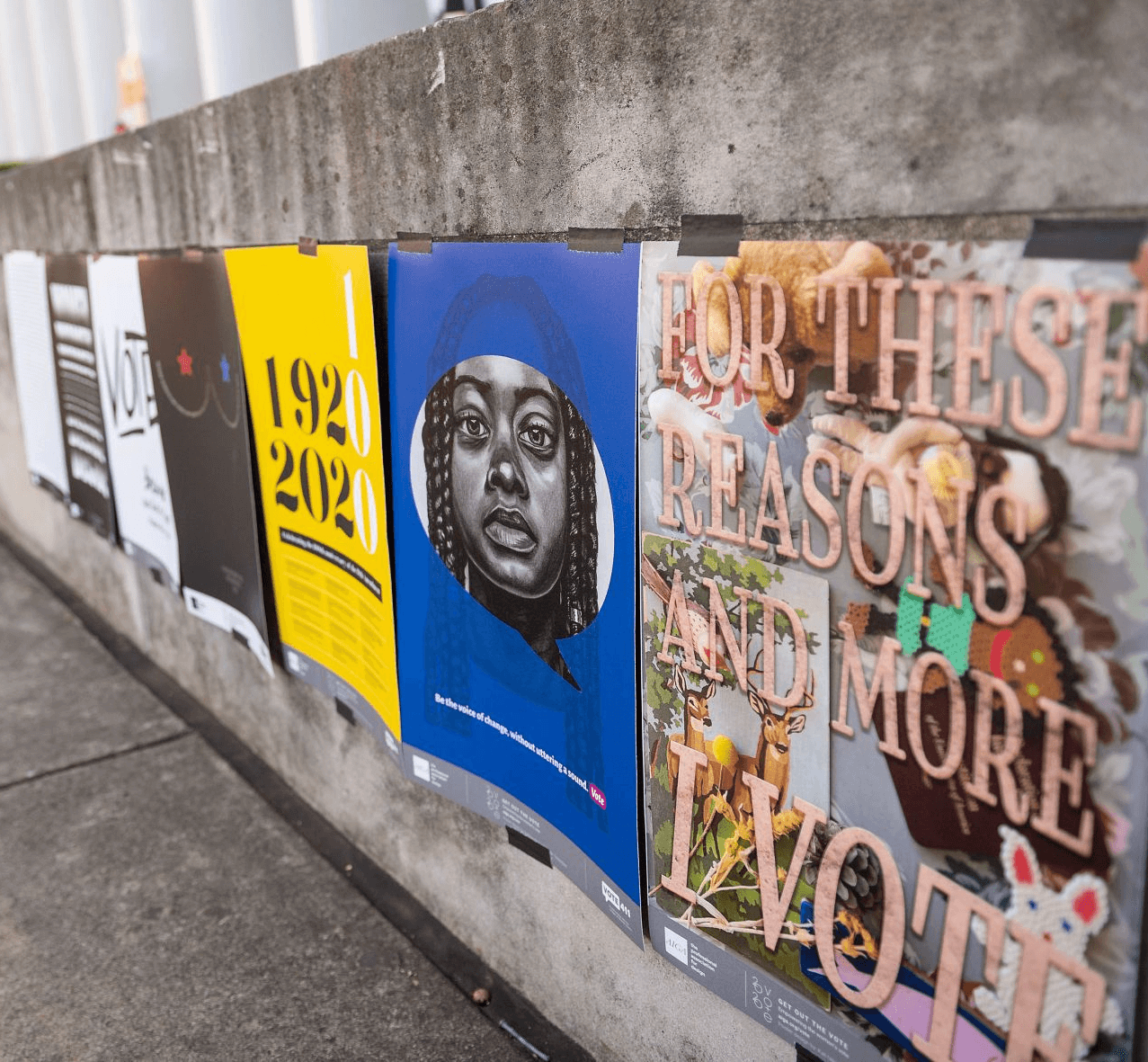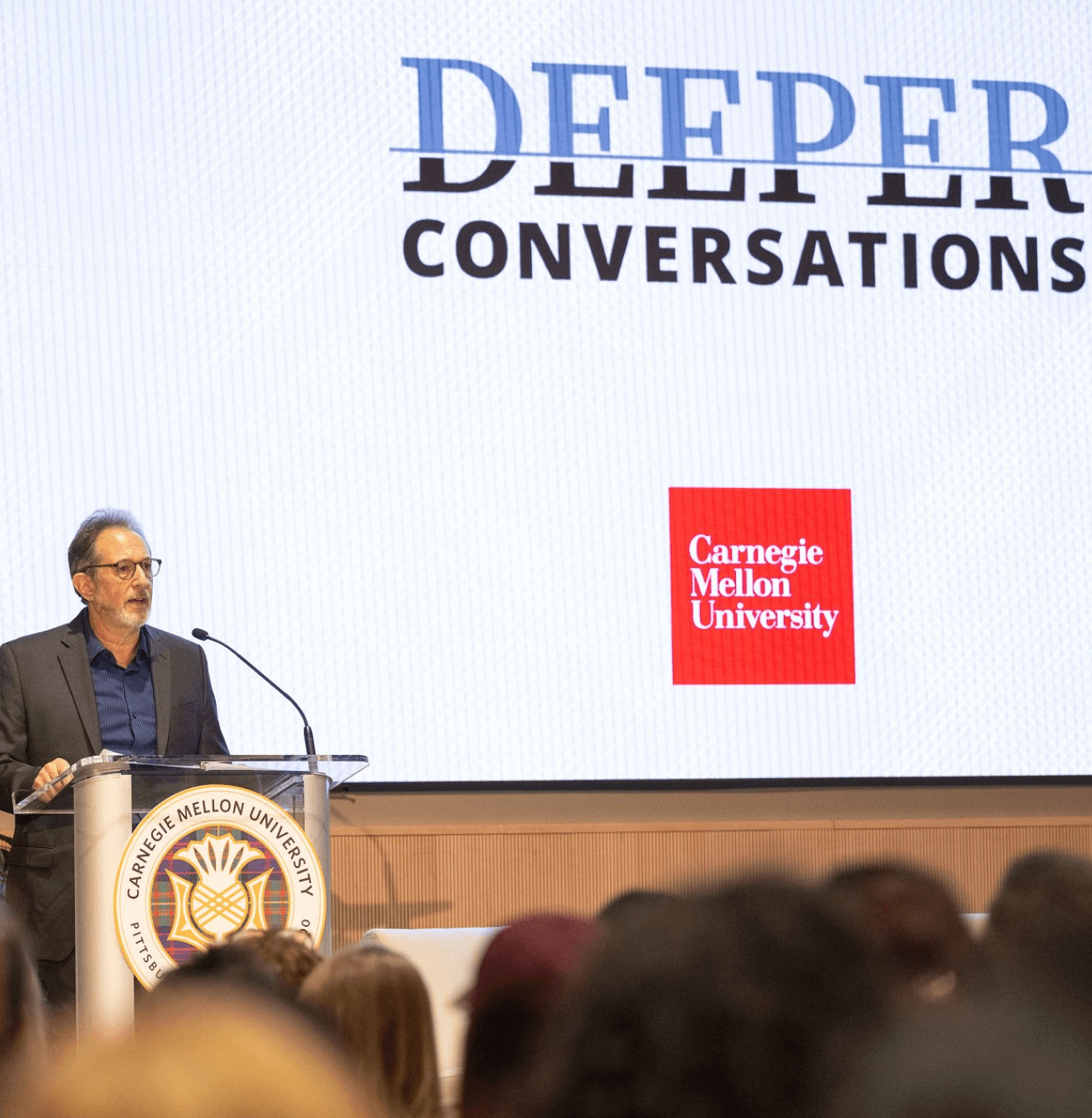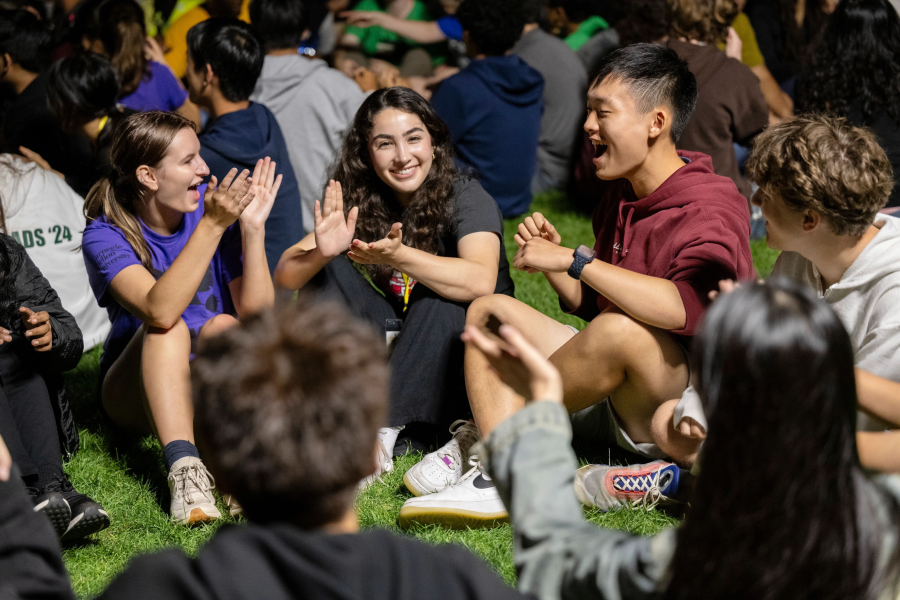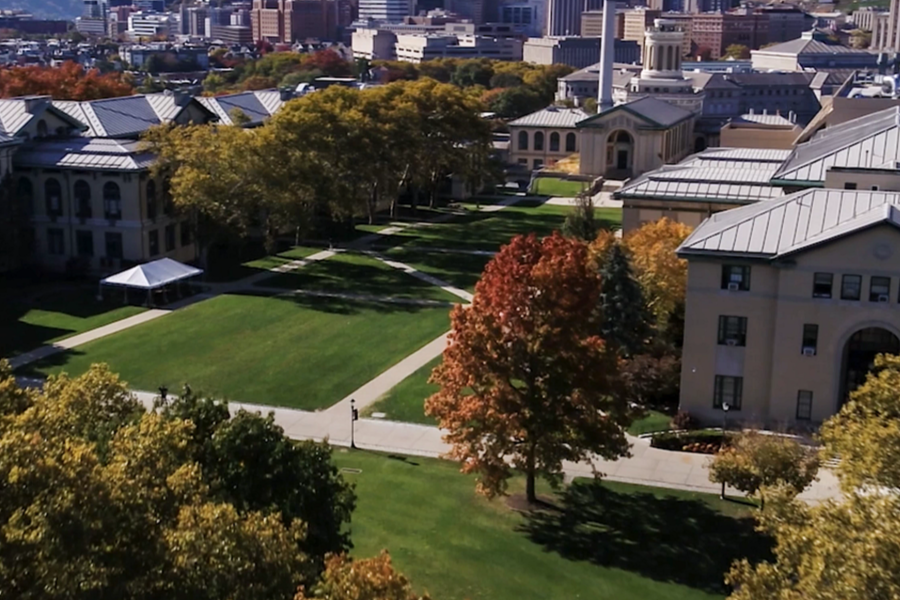Having a Voice and Hearing Others at Carnegie Mellon University
A Commitment to Free Expression and Civil Discourse
Freedom of expression is central to Carnegie Mellon’s mission, and we have a longstanding and deep-rooted commitment to upholding it and its companion of academic freedom on our campus. These are core values of our institution and to the success of higher education, where our spaces should be a place of challenging ideas, critical analysis, and thoughtful discourse and dialogue.
Complementing these freedoms with a commitment to civility and physical safety is vital to creating the type of environment that supports the work that we do across CMU. Our work to support freedom of expression is grounded in our university's vision, mission and values, which are paramount as we continuously nurture an environment of excellence and impact. These values have long been a part of life at CMU, through things such as “The Fence,” which has stood as a self-regulating, student-governed space for open expression for a century. The university has developed guidelines, programs and resources to promote the free exchange of ideas and this page offers a central resource to guide you to them.
We strongly believe our campus should be a place to discuss a variety of perspectives, even as we acknowledge that there may be discomfort and tension in the process. It is up to all of us to create the conditions for civil discourse, safety, and to build a culture of belonging and inclusion for all. It is by engaging in this work together that we are truly able to expand our knowledge and build bridges of understanding.
Carnegie Mellon has traditionally hosted events that are part of political campaigns to enhance our culture of civic engagement. All candidates for office may submit requests. It is important to underscore that the presence of any political figure is not an endorsement from Carnegie Mellon. These events are subject to similar guidelines and procedures as other expressive activity events on campus.
Read more in the FAQs on campaign events at CMU below.
On this page is a quick guide to the policies and resources at CMU that can help us all hold up these ideals.
Resources and Guides to Free Speech and Academic Freedom at CMU
Carnegie Mellon’s Freedom of Expression Policy is the foundational university touchstone outlining how we operationalize these values and commitments. As stated in the policy:
Carnegie Mellon University values the freedoms of speech, thought, expression and assembly — in themselves and as part of our core educational and intellectual mission. If individuals are to cherish freedom, they must experience it. The very concept of freedom assumes that people usually choose wisely from a range of available ideas and that the range and implications of ideas cannot be fully understood unless we hold vital our rights to know, to express, and to choose. The university must be a place where all ideas may be expressed freely and where no alternative is withheld from consideration. The only limits on these freedoms are those dictated by law and those necessary to protect the rights of other members of the University community and to ensure the normal functioning of the University.
Read more about the policy and our community’s rights and responsibilities here.


Ways to be Involved
There are numerous opportunities planned for our community this fall to engage in meaningful dialogue and exploration of complex issues affecting today’s society. Some examples include:
Our successful Deeper Conversations series returns, focusing on the complex issues of today, with a full schedule of speakers.
On September 19, the University Lecture Series will kickoff with a lecture by Teresa Bejan titled "What Can I Say? Free Speech and Civility in a Tolerant Society."
And on Election Day itself, the CMU community will have the space to make their voices heard at the ballot box. That day is declared Democracy Day at CMU, with special activities planned on campus
Recognizing the need for tools our faculty can employ as they engage in relevant discussions, our Eberly Center for Teaching Excellence and Innovation has strategies and resources for “Teaching in Tumultuous Times.”
Being a part of the community, on and off campus, to learn about real-world issues and how to solve them is a key part of a Carnegie Mellon education. Students can find numerous opportunities for civic engagement through organizations, events, and programs. There are opportunities to expand perspective through events and initiatives hosted by the Vice Provost for Diversity, Equity and Inclusion team including the Center for Student Diversity and Inclusion. Students can develop a holistic approach to care for self and community through civility and wellness and meaning making initiatives.
Scheduling and Safely Hosting On-campus Events Involving Expressive Activity
Students, faculty or staff who wish to organize demonstrations, protests, rallies or other events involving expressive activity on campus are expected to follow new scheduling procedures designed to support an environment for safe, civil and free exchange. University decisions related to scheduling requests and procedures will be made in a content-neutral manner that is in keeping with the Freedom of Expression policy. In support of these events, the university has developed an Expressive Activity Support Team comprised of trained staff members from both the Student Affairs and Provost’s division who will serve as an on-site resource to assist organizers, participants and bystanders as needed. Campus police officers can also support; they are prepared for a variety of circumstances and well-versed in de-escalation techniques.


CMU’s Policy on Tents and Encampments
Carnegie Mellon values and supports the right to assemble and exercise free expression; however, tents, encampments and structures used for the purposes of occupation risk compromising the regular functioning of the university relative to campus safety, security and access, as well as its primary mission of teaching, learning and research, and are therefore prohibited. The university does permit the longstanding and narrowly defined practice of allowing for Carnegie Mellon students guarding The Fence to occupy one or two tents in support of overnight guarding and painting activities.
Why did Carnegie Mellon update its procedures for the scheduling of certain expressive activities?
In the last couple years, there has been an increase in the volume of expressive activity events on campus (as there were on many campuses around the country). We heard from both those holding events and our campus community that they were seeking clarity on our existing expectations for event planning detailed in the Procedures, which accompany the Freedom of Expression Policy. Based on this feedback and our experiences over the past year, we have refined and clarified the procedures used for coordinating expressive activity and re-published them to the campus community.
Is this a change to CMU’s Freedom of Expression Policy?
The university reviewed possible revisions and updates to the Freedom of Expression Policy based on the recommendations contained in the Final Report from the Commission on Academic Freedom and Freedom of Expression issued in October 2022. Over the past semester, we invited the campus community to engage in an open comment period about the Freedom of Expression Policy and related guidance and procedures first introduced last year. These are updates to the Freedom of Expression Policy endorsed by the University Leadership Council and Faculty Senate.
Are these new procedures at CMU?
No. The procedure revisions we’ve enacted sought to provide clearer directions, including setting above 50 participants as the attendance threshold for scheduling expressive activity events on campus.
Were students, faculty and staff involved in the process?
Yes. University leaders worked with students, faculty, staff and governance groups to understand our community’s concerns and needs when developing the Freedom of Expression Policy and the guidance and procedures with the CMU Student Government, the Faculty Senate along with Staff Council and university leadership offering feedback. Following these discussions, the university finalized and published the clarified procedures online and shared them with the university community, with an update published in the summer of 2025.
For what topics or types of expressive events will this apply?
The group that refined the procedures had a charge of looking at any changes through a “content neutral” lens; that is, the procedures would apply in any expressive activity regardless of the viewpoint being expressed. The primary goal is to prioritize civility, safety, and the normal operations of the campus in order to allow members of the community to study, teach and work, while supporting free expression.
Are university lectures and departmental programs required to schedule?
No. These are official university events.They are not expressive activities. Official university events, including those associated with a scheduled university course, do not require registration, but as with any event would need to follow regular procedures for reserving space and other protocols.
Does a successful scheduling depend upon the type of event and subject of the event being held?
No. Scheduling decisions are intended to promote safety and support the regular operations of the university. Our goal is to work through the advising process with event planners so that we can tell organizers yes, they may proceed.
Doesn’t this procedure curb the free expression rights of students, faculty and staff?
No. Our commitment to free expression remains unwavering. Our Freedom of Expression Policy supports individuals’ basic rights as defined by the U.S. Constitution as long as it does not detract from the safety of our community members or the normal functions of our university.
Will police disband an unscheduled protest/event on campus?
A group of trained volunteers from the CMU Division of Student Affairs and CMU Provost’s office are our Expressive Activity Support Team. These volunteers will help ensure that an event adheres to university procedures and is conducted safely. They will inform organizers of the university’s expectations. Participants in an unregistered event will have an opportunity to leave on their own. The CMU Police Department would only act to preserve a safe and functioning campus when necessary.
Why is 50 the number above which scheduling of an expressive event is required?
The requirement of a threshold of 50 participants was selected as a reasonable number of participants for a small event.
Is the university going to prevent non-CMU participants from coming onto campus for protests and other activities?
What happens if a CMU student, faculty or staff member is alleged to have violated the university’s community standards while engaged in expressive activity?
In many cases, an educational intervention could resolve the matter without formal conduct review. When necessary, students are subject to the community standards process, which involves a case-by-case, due process review regarding whether a student’s behavior violates university policy, as outlined in The Word. Similarly, the Staff Handbook and the Faculty Appointment and Tenure Handbook would govern whether a conduct matter rose to the level of a formal review.
Can a campaign hold an event at Carnegie Mellon?
Yes. The university has facilitated the hosting of campaign events on campus as part of a vibrant civic culture and student experience. Candidates for president have visited CMU during every campaign since 2000. While the University hosts these events, it absolutely does not endorse any candidate or take any political stance.
Must CMU hold a campaign event if a candidate requests?
No. The university is not required to provide space for an event if the university cannot accommodate the request or if the event would disrupt the mission of the university or would jeopardize the safety of the campus community.
Are campaign events considered CMU events?
Campaign events that are hosted on our campus are not CMU events although the university works closely with the campaign to ensure adherence to safety, proper logistical coordination and to minimize disruption to campus operations.
Given the university's non profit status, what regulations govern these campaign events?
- The university extend a comparable invitation to all other candidates for the office pertinent to the campaign event;
- The university charge a fair market rate for facilities and other expenses and not incur expenses related to the event.
- University resources are not used for the campaign or otherwise and
- The campaign event must provide a dialogue on policy issues.
Can an organization on campus invite a candidate to campus for an event?
Yes. Federal requirements allow sponsoring organizations at a university to invite candidates to meet with students, staff and faculty. For these sponsored events, the sponsoring organization must set and control the agenda and issue invitations to attendees. The candidates must speak to specific policy concerns of interest to the university community and the agenda must include an opportunity for a question and answer period. Similar to hosted events, the university must document that an equivalent opportunity is extended to all official candidates for the same office.
Can candidates hold fundraisers on campus?
No. IRS regulations prohibit fundraising activities on campus grounds.
Is it legal for voter registration drives to take place on campus?
Yes, and federal law requires institutions to make a good faith effort to distribute voter registration forms and make such forms widely available to students in attendance. The IRS grants universities the ability to allow outside groups to conduct voter registration activities on campus. The organizations conducting the registration drives must commit to registering all voters regardless of party affiliation. They cannot distribute campaign material as a part of the registration process.
May CMU host a candidates debate?
Yes, for both primary and general elections. Federal regulations require that all declared candidates who meet state regulations to appear on the ballot must be invited to participate.